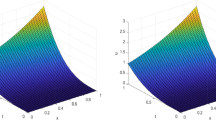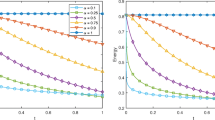Abstract
In this paper, we propose a conservative three-layer linearized difference scheme for the two-dimensional nonlinear Schrödinger equation with fractional Laplacian. The difference scheme can be strictly proved to be uniquely solvable, conservation of mass and energy in the discrete sense. Furthermore, it is shown that the difference scheme is unconditionally convergent and stable under \(l^{\infty }\)-norm by discrete energy method. The convergence order is \(\mathcal {O}(\tau ^2+h^2)\) with time step \(\tau \) and mesh size h. Numerical examples are given to demonstrate the theoretical results.





Similar content being viewed by others
References
Amore, P., Fernandez, F.M., Hofmann, C.P., Saenz, R.A.: Collocation method for fractional quantum mechanics. J. Math. Phys. 51, 122101 (2010)
Asadzadeh, M., Standar, C.: Approximating the nonlinear Schrödinger equation by a two level linearly implicit finite element method. J. Math. Sci. 239, 233–247 (2019). https://doi.org/10.1007/s10958-019-04301-1
Bhrawy, A.H., Zaky, M.A.: An improved collocation method for multi-dimensional space-time variable-order fractional Schrödinger equations. Appl. Numer. Math. 111, 197–218 (2017)
Cheng, B.R., Wang, D.L., Yang, W.: Energy preserving relaxation method for space-fractional nonlinear Schrödinger equation. Appl. Numer. Math. 152, 480–498 (2020)
Defterli, O., D’Elia, M., Du, Q., Gunzburger, M., Lehoucq, R., Meerschaert, M.: Fractional diffusion on bounded domains: Fractional Calculus and Applied. Analysis 18, 342–360 (2015)
Duo, S.W., Zhang, Y.Z.: Mass-conservative Fourier spectral methods for solving the fractional nonlinear Schrödinger equation. Comput. Math. Appl. 71, 2257–2271 (2016)
Felmer, P., Quaas, A., Tan, J.: Positive solutions of the nonlinear Schrödinger equation with the fractional Laplacian. Proc. R. Soc. Edinb.: Sect. A Math. 142, 1237–1262 (2012)
Guo, B.L., Huo, Z.H.: Global well-posedness for the fractional nonlinear Schrödinger equation. Commun. Partial Differ. Equ. 36, 247–255 (2011)
Guo, B.L., Huo, Z.H.: Well-posedness for the nonlinear fractional Schrödinger equation and inviscid limit behavior of solution for the fractional ginzburg-landau equation. Fractional Calculus Appl. Anal. 16, 226–242 (2013)
Guo, B.L., Han, Y.Q., Xin, J.: Existence of the global smooth solution to the period boundary value problem of fractional nonlinear Schrödinger equation. Appl. Math. Comput. 204, 468–477 (2008)
Guo, X.Y., Jiang, X.Y.: Some physical applications of fractional Schrödinger equation. J. Math. Phys. 47, 082104 (2006)
Hao, Z.P., Zhang, Z.Q., Du, R.: Fractional centered difference scheme for high-dimensional integral fractional Laplacian. J. Comput. Phys. 424, 109851 (2020)
Hu, Y., Kallianpur, G.: Schrödinger equations with fractional Laplacians. Appl. Math. Optim. 42, 281–290 (2000)
John, R.: Elliptic Operators, Topology, and Asymptotic Methods. Chapman and Hall/CRC, London (1999)
Landkof, N.S.: Foundations of Modern Potential Theory, vol. 180. Springer-Verlag, Berlin Heidelberg (1972)
Laskin, N.: Fractional quantum mechanics. Phys. Rev. E 62, 3135–3145 (2000)
Laskin, N.: Fractional quantum mechanics and lévy path integrals. Phys. Lett. A 268, 298–305 (2000)
Li, M., Gu, X.M., Huang, C.M., Fei, M.F., Zhang, G.Y.: A fast linearized conservative finite element method for the strongly coupled nonlinear fractional Schrödinger equations. J. Comput. Phys. 358, 256–282 (2018)
Li, M., Huang, C.M., Wang, P.D.: Galerkin finite element method for nonlinear fractional Schrödinger equations. Numerical Algorithms 74, 499–525 (2017)
Li, Y., Zhao, D., Wang, Q.X.: Ground state solution and nodal solution for fractional nonlinear Schrödinger equation with indefinite potential. J. Math. Phys. 60, 041501 (2019)
Liao, H.L., Sun, Z.Z., Shi, H.S.: Maximum norm error analysis of explicit schemes for two-dimensional nonlinear Schrödinger equations. Scientia Sinica (Mathematica) 40, 827–842 (2010). (in chinese)
Longhi, S.: Fractional Schrödinger equation in optics. Opt. Lett. 40, 1117–1120 (2015)
Pan, K.J., Jin, X.L., He, D.D., Zhang, Q.F.: Optimal pointwise error estimate for the numerical solutions of two-dimensional space fractional nonlinear schrödinger equation. arXiv: Numerical Analysis (2019)
Pinsker, F., Bao, W., Zhang, Y., Ohadi, H., Dreismann, A., Baumberg, J.J.: Fractional quantum mechanics in polariton condensates with velocity-dependent mass. Phys. Rev. B 92, 195310 (2015)
Samko, S., Kilbas, A., Maricev, O.: Fractional Integrals and Derivations and Some Applications. Gordon and Breach Science, Abingdon (1993)
Secchi, S.: Ground state solutions for nonlinear fractional Schrödinger equations in \(r^n\). J. Math. Phys. 54, 031501 (2013)
Sun, Z.Z.: Numerical Methods of the Partial Differential Equations. Science Press, China (2012)
Sun, Z.Z.: Finite Difference Method for Nonlinear Development Equation. Science Press, China (2018)
Sun, Z.Z., Zhao, D.D.: On the \(l^\infty \) convergence of a difference scheme for coupled nonlinear Schrödinger equations. Comput. Math. Appl. 59, 3286–3300 (2010)
Tian, B., Shan, W.B., Zhang, C.Y., Wei, G.M., Gao, Y.T.: Transformations for a generalized variable-coefficient nonlinear Schrödinger model from plasma physics, arterial mechanics and optical fibers with symbolic computation. Phys. Condens. Matter 47, 329–332 (2005)
Wang, D.L., Xiao, A.G., Yang, W.: Crank–Nicolson difference scheme for the coupled nonlinear Schrödinger equations with the Riesz space fractional derivative. J. Comput. Phys. 242, 670–681 (2013)
Wang, D.L., Xiao, A.G., Yang, W.: A linearly implicit conservative difference scheme for the space fractional coupled nonlinear Schrödinger equations. J. Comput. Phys. 272, 644–655 (2014)
Wang, P.D., Huang, C.M.: A conservative linearized difference scheme for the nonlinear fractional Schrödinger equation. Numerical Algorithms 69, 625–641 (2015)
Wang, P.D., Huang, C.M.: An energy conservative difference scheme for the nonlinear fractional Schrödinger equations. J. Comput. Phys. 293, 238–251 (2015)
Wang, P.D., Huang, C.M.: Split-step alternating direction implicit difference scheme for the fractional Schrödinger equation in two dimensions. Comput. Math. Appl. 71, 1114–1128 (2016)
Wang, Y., Mei, L.Q., Li, Q., Bu, L.L.: Split-step spectral Galerkin method for the two-dimensional nonlinear space-fractional Schrödinger equation. Appl. Numer. Math. 136, 257–278 (2019)
Weinan, E., Ma, C., Wu, L.: Barron spaces and the compositional function spaces for neural network models. arXiv:org/abs/1906.08039 (2019)
Xu, J.: Finite neuron method and convergence analysis. Commun. Comput. Phys. 28, 1707–1745 (2020)
Xu, Y., Shu, C.: Local discontinuous Galerkin methods for nonlinear Schrödinger equations. J. Comput. Phys. 205, 72–97 (2005)
Zhai, S.Y., Wang, D.L., Weng, Z., Zhao, X.: Error analysis and numerical simulations of strang splitting method for space fractional nonlinear Schrödinger equation. J. Sci. Comput. 81, 965–989 (2019)
Zhang, F., Pérez-García, V.M., Vázquez, L.: Numerical simulation of nonlinear Schrödinger systems: a new conservative scheme. Appl. Math. Comput. 71, 165–177 (1995)
Zhang, Q.F. and Hesthaven, J., Sun, Z.Z., Ren, Y.Z.: Pointwise error estimate in difference setting for the two-dimensional nonlinear fractional complex Ginzburg–Landau equation. https://www.researchgate.net/publication/344102816 (2020)
Zhang, R.P., Zhang, Y.T., Wang, Z., Chen, B., Zhang, Y.: A conservative numerical method for the fractional nonlinear Schrödinger equation in two dimensions. Science China (Mathematics) 62, 1997–2014 (2019)
Zhao, X., Sun, Z.Z., Hao, Z.P.: A fourth-order compact adi scheme for two-dimensional nonlinear space fractional Schrödinger equation. SIAM J. Sci. Comput. 36, A2865–A2886 (2014)
Acknowledgements
This work is financially supported by the National Natural Science Foundation of China (Grants No. 11602057) and Qinglan Project.
Author information
Authors and Affiliations
Corresponding author
Additional information
Publisher's Note
Springer Nature remains neutral with regard to jurisdictional claims in published maps and institutional affiliations.
Appendix A
Appendix A
For the coefficients of the discrete fractional Laplacian,
we denote
And we denote the \(s'\)th Sobolev space
where \(\mathcal {T}=[-\pi , \pi ]^2\) . Since \(\varPsi (\eta )\in W^s({\mathcal {T} })\), here \(s= 1+\alpha + \epsilon \) for any small \(\epsilon >0\). It can be seen from book [14] on page 72, there is
For bigger j, k, we have
Assume \(u\in \mathcal {B}^{2+\alpha }\). Denote
We have
From Lemma 2.1, we have
And
Assume u(x, y) is the algebraic decay function, i.e. \(u(x,y) = \frac{1}{(x^2+y^2)^{\delta }}, (\delta >0)\). For the first term \({i}\) of Eq. (A.1), we have
There is a constant C, which satisfies
Since \({s(\alpha )}>2\), for Eq. (A.2), we have
For the remaining items in Eq. (A.1), the same inequality can be obtained. Now denote \(L=h^{-\beta }\). Therefore, we have
When \(\delta \beta >1+\alpha /2\), we have
Therefore, when \(\delta \beta \ge 1+\alpha /2\), i.e, the solution u decay enough fast, we can have
Rights and permissions
About this article
Cite this article
Wang, Y., Hao, Z. & Du, R. A Linear Finite Difference Scheme for the Two-Dimensional Nonlinear Schrödinger Equation with Fractional Laplacian. J Sci Comput 90, 24 (2022). https://doi.org/10.1007/s10915-021-01703-9
Received:
Revised:
Accepted:
Published:
DOI: https://doi.org/10.1007/s10915-021-01703-9




